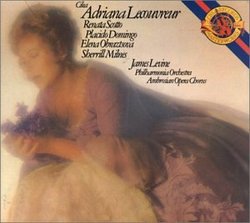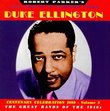| All Artists: Cilea, Domingo, Milnes, Scotto, Levine Title: Adriana Lecouvreur Members Wishing: 1 Total Copies: 0 Label: Sony Release Date: 10/11/1989 Genre: Classical Style: Opera & Classical Vocal Number of Discs: 1 SwapaCD Credits: 1 UPC: 074643458825 |
Search - Cilea, Domingo, Milnes :: Adriana Lecouvreur
 | Cilea, Domingo, Milnes Adriana Lecouvreur Genre: Classical
|
Larger Image |
CD DetailsSimilar CDs
|
CD ReviewsThe Definitive recording of Adriana Lecouvreur on CD. 08/15/1999 (5 out of 5 stars) "Stereo Review ranked this recording as one of the years best when it was released. It's not hard to see why, for whether or not you are a fan of Cilea's work, there can be little doubt that this performance works at all levels. Levine brings energy and passion to Cilea's complex score. If you love lush orchestrations and soaring vocal lines, it dosen't get any better than this! Hardly a page goes by in this score without harp, celeste, bells, and other special orchestral effects punctuating the score. All this is masterfully and lovingly handled by conductor James Levine. He has a cast that is up to all the technical and dramatic demands of the work. Sherril Milnes is a very good Michonnet. Though there have been better, (Gobbi, Taddei, Bastianini, etc.), we are fortunate to have his interpretation in this performance. Milnes is especially moving in his Act I monologue where he comments on Adriana's onstage performance. His utterance of the line "Bene, Benissimo!" is not easily forgotten - it is tender and frought with contained emotion. Elena Obraztsova thrilling voice has never been captured better on a recording. The role of the Princess is dramatically and vocally a perfect fit for her. Her Act II aria has never sounded so dramatic or opulent. Placido Domingo is a great Maurizio in a line of great Maurizio's, (Caruso was the first, Corelli the most recent before Domingo took on the role). He caputures the great swashbuckling side of the character, as well as Maurizio's romantic, tender, and tragic moments. All his arias and duets are opulently sung with great vocal beauty and keen dramatic insight. Renata Scotto is nothing short of brilliant in her portrayal of the famous French Actress. She is at the peak of her operatic career here, (1976). Her voice is able to meet all the demands of the score with ease. She is brilliant in Adriana's declamations and intense drammatic musical lines. She also spins the most tender and beautifully floated pianissimo's one is likely to hear. She is also a master at the use of the chest voice and the parlando. Her rythmic precision and articulqtion throughout the performance is incredible! Run, don't wait, to buy this recording. I have over 1,500 complete operas on CD, this is one of my top 10 picks!Steve Olla" Hot! Scotto is a True Singing Actress! essmac | Nashville, TN USA | 02/29/2000 (5 out of 5 stars) "The Levine/Scotto/Domingo/Milnes team triumphs again (check out their fabulous recording of Andrea Chenier). Domingo sings beautifully as usual, Orbratsova is better than usual, and Milnes makes a strikingly sympathetic character out of Michonnet. And Scotto... amazing! The singing is not as good as in the Chenier recording, but still fabulous- extremely expressive, full of amazing feats of breath control, diminuendi, floated high notes, flawless legato. But even more stunning are the spoken passages- blazingly dramatic and not declaimed in embarrassing opera-acting style. The third act passage in which Adrianna lets the Princess have it is absolutely hair-raising (a cliche, but listen for yourself and see). It all culminates in a death scene as emotionally intense as anything you're likely hear on CD. This is the one to own, and if you think this type of opera is just too trashy- I dare you listen to a committed, superior performance like this and not be utterly won over." The Premiere Adriana Recording 02/23/2006 (5 out of 5 stars) "CAST: Renata Scotto[Adriana Lecouvreur] ** Plácido Domingo[Maurizio] ** Sherill Milnes [Michonnet] ** Elena Obraztsova) [Princess di Bouillon] ** Giancarlo Luccardi [Prince of Bouillon] ** Lillian Watson [Madame Jouvenot] ** Anne Murray [Madame Dangeville] ** Paul Crook [Poisson] ** Paul Hudson [Quinault] ** Paul Crook [A Man-Servant] ** Ambrosian Opera Chorus ** Philharmonia Orchestra ** James Levine (conductor)
This late 70's recording of Francesco Cilea's Adriana Lecouvreur is an outstanding example of how this rare and out-of-vogue opera can be thrilling and powerfully moving. Most opera houses in the States, the Met included, don't stage Adriana anymore as it's faded into a kind of curiosity, a remnant of the turn-of-the-century verisimo opera era. Now, only two arias - "Io Sono La Umile Ancella" and "Poveri Fiori" sung by Adriana remain popular arias for concerts and recitals. This particular recording is of special importance because it marked the last time that Placido Domingo, Renata Scotto and Sherill Milnes worked together on a studio recording, after a period of time in the late 70's when they recorded for RCA - namely Otello and Andrea Chenier. For fans of these singers, and mezzo-soprano Elena Obrazstova, this recording is a treasure and a must-have. In addition, James Levine is conducting with his usual supreme artistry and the Philharmonia Orchestra brings out both beautiful moments and dramatic ones, nuance and subtleties. This one is for me the best Adriana Lecouvreur, even if there is a recording with everyone's god-damn favorite Maria Callas. RENATA SCOTTO understood both the textual and musical aspects of Italian opera and she is largely considered, along with Mirella Freni, to be one of the last true Italian divas. Scotto had her share of critics and fanatics. There were some performances in which her voice failed her and one could sense her fury (very much like Maria Callas in this respect). Her Norma is thought to be the worst operatic disaster. But in the intense, Italian verisimo operas - Tosca, Cavalleria Rusticana, Andrea Chenier- she is unrivaled. But she is just as successful in more lyrical Italian operas - La Traviata, La Boheme, and of course her signature role Madama Butterfly. Adriana Lecouvreur fits her like a glove in so many levels. The Italian phrasing, with strong dramatic emphasis on certain exclamations, suits her type of dramatic voice. She uses chest register to effectively sound dramatic and fiery. Adriana is an actress of the Comedie Francaise in 1730 Paris. The fact that a diva is playing a diva is delicious, and with Scotto providing the singing, one is in for a real treat. In many instances, I felt that Scotto is singing a lot like Puccini's Tosca, but the music feels a lot longer and less hurried than Tosca. She can therefore relax her voice in the more lyrical portions. She is feminine, alluring, regal and vulnerable. The last scene, in which she expires after smelling poisoned flowers (the weakest and lamest ending of an opera heroine yet but go figure)does not become excessively dramatic or laughable. She is wholly convincing as a woman who just happened to smell poison and is short of breath and dies. This role is perhaps one of her best. There is absolutely nothing I find wrong with the voice. It's fresh, powerful and beautiful and she gets into character so well. PLACIDO DOMINGO, SHERILL MILNES AND ELENA OBRAZSTOVA: The rest of the cast is admirable and excellent. Domingo as Maurizio is brilliantly sung, even if we are not getting anything too different from his Italian romantic hero roles. He is in fine vocal shape, he sounds passionate, his sense of lyrical melody is well-placed and his attention to detail is exact. If Pavarotti had sung this instead of Domingo, one would quickly find fault with Pavarotti's lack of musical intelligence and singing for the sake of showing off. Not so with Domingo who gets into character each time. His duets and scenes with Scotto's Adriana are beautiful, especially in the moving finale. Another reason why his Maurizio is especially powerful is because he is singing a role that was one of the great Enrico Caruso's greater operatic successes. All true analytical opera connoisseurs recognize a similar timbre and vocal quality between Enrico Caruso and Placido Domingo. Domingo never really imitated Caruso but his voice was somewhat similar in its sheer, sensual, expressive lyrical strength. Baritone Sherill Milnes is also not singing anything too different from his other baritone roles. His part here is not that big when compared to the evil and jealous Princess Di Boullon. Milnes sings everything in a grand manner, and each aria showcases his phenomenal lung power and lower voice with great bravura. Russian mezzo soprano sensation Elena Obrazstova was internationally acclaimed for a time in the 70's and 80's. She is a supremely exciting high mezzo with an amazingly strong lower range. Consequently, her Carmen, Princess Eboli in Don Carlo, Amneris in Aida, Santuzza in Cavalleria, Azucena and other roles are the best on record. In this opera, she is playing the villain, Adriana's jealous rival, the Princess of Boulon who, in an effort to get Maurizio for herself and to get rid of her enemy, sends Adriana poison flowers. Obraztsova pulls out all the stops for this one, especially because this role is a principal one, allowing her more opportunities to act and sing with fiery intensity. Her duets and scenes with Domingo are electrifying. Her solo arias are simulatenously lyric-expressive and powerfully bombastic. Very few mezzos sang like Elena Obraztsova but it is also said that her Slavic/Russian category of voice helped to make her roles especially thunderous. She does not have the more lyric Italian mezzo voice- like those of Giuletta Simionato and Fiorenza Cossotto. But truthfully, while those singers have their own good aspects, so does Obrazstova who could thrill audiences with a far bigger voice and a more dramatic interpretation. This one is a winner. Everything from the music to the singer's strong talents come together for what is the premire recording of Adriana Lecouvreur. Hopefully some day soon, the Metropolitan Opera and other major opera houses in the States and Europe will remember just why Adriana was a great opera at the turn of the century when verisimo was in vogue. This opera was another of Enrico Caruso's success. Perhaps with that knowledge, people will re-discover the greatness of Adriana Lecouvreur, despite that pathetic ending in which she dies after smelling flowers that didn't sit well with her nostrils." |

 Track Listings (15) - Disc #1
Track Listings (15) - Disc #1

